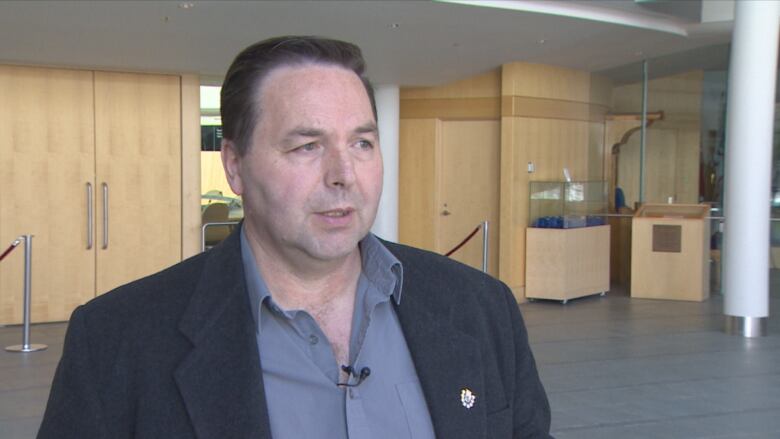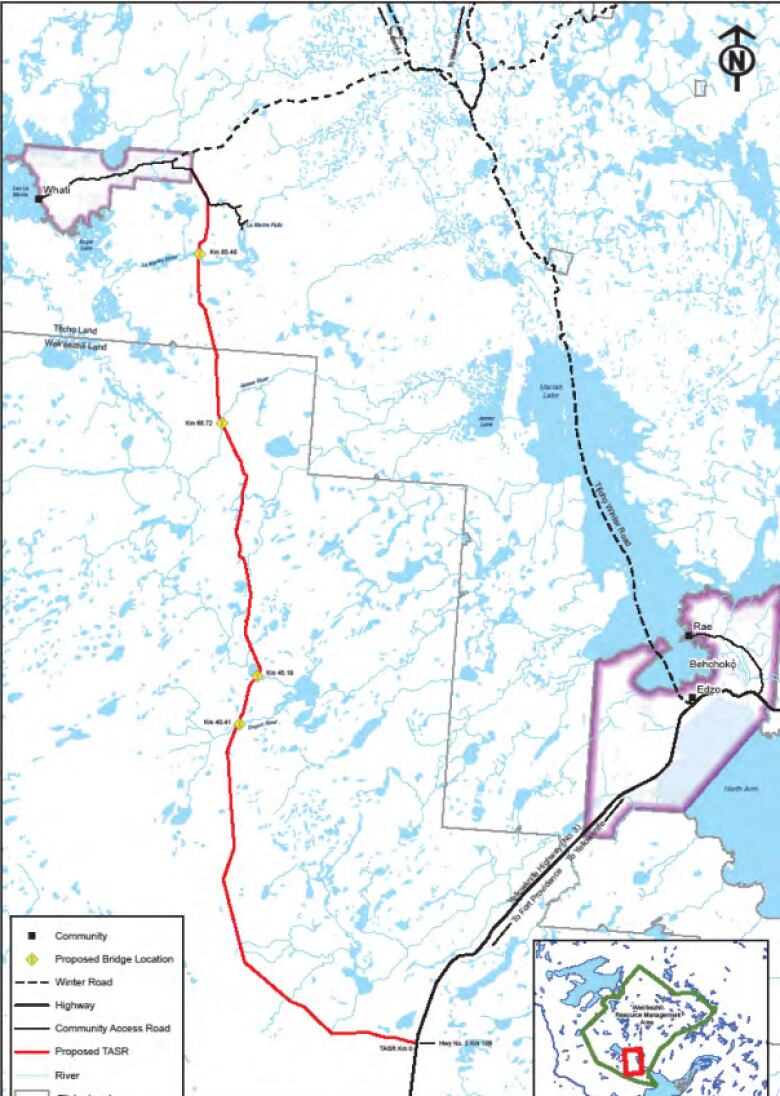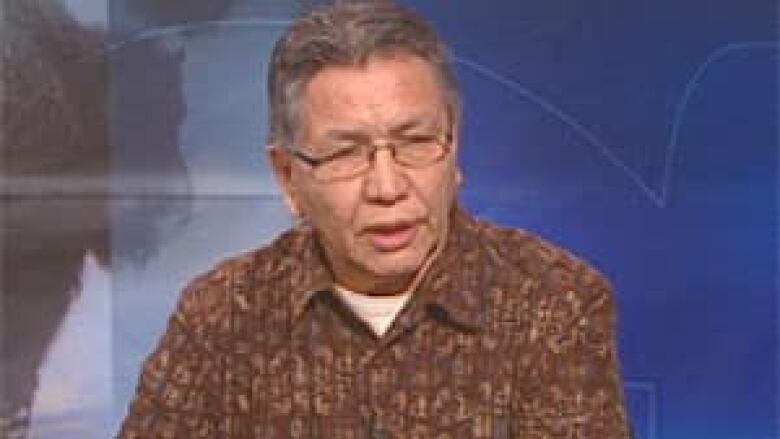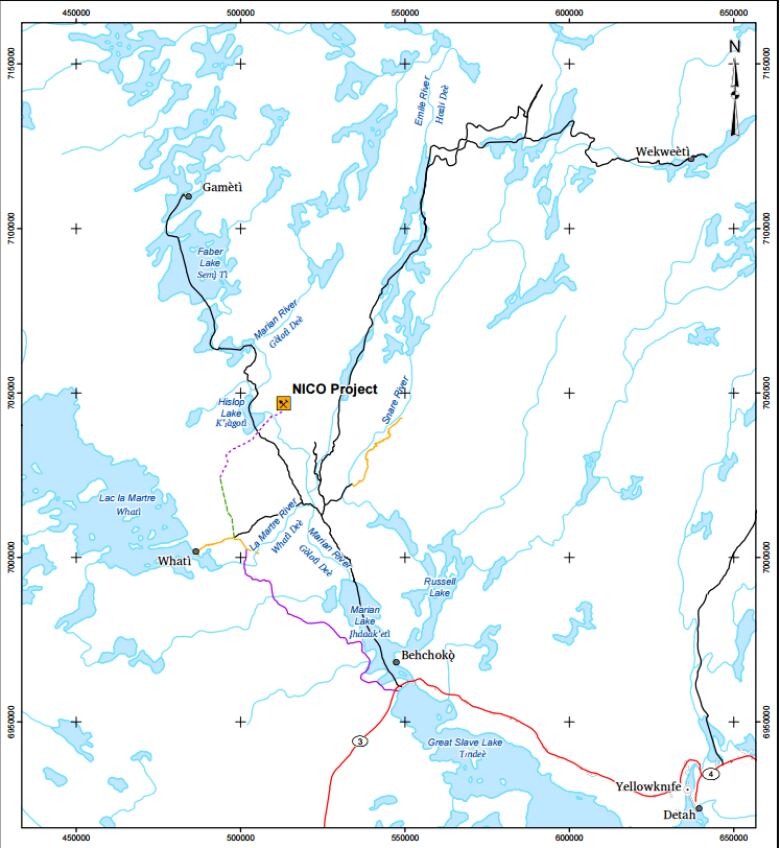N.W.T. continues down $150M road to Whati
Tlicho Government lobbied hard for all-season road to small community

A proposed $150 million all-season road to the Tlicho community of Whati is another step closer to reality, though it's still unclear how the Northwest Territoriesplans to pay for it.
Last week the N.W.T. Department of Transportation applied for the permits to build the 94-kilometre, two-lane gravel road to the community with a population of about 500.
The Whati road is one of several expensive infrastructure projects (including an all-weather highway from Wrigley and Norman Wells and the partial all-weather conversion of the ice road supplying the N.W.T.'s diamond mines) that the territory continues to plan for even as it predicts it will start posting a deficit in 2018.
The territory is hoping to receive money as much as 25 per cent of the Whati road's cost from the federal government's P3 Canada Fund.
P3 Canada is currently reviewing the government's proposal. If it passes on the project, "conventional financing will be considered," according to the project description filed by the Department of Transportation.

Current winter road costs
The Whati road will begin at Highway 3, near Behchoko, and continue north.
It will replace Whati's current winter road, part of a wider Tlicho winter road system that is costing the territorial government more and more money to build every year because of unpredictable weather and warmer ice road conditions.
"It has been necessary to invest in costly new technologies and equipment over the past decade," according to the project description.
"In 2004 DOT paid $1,050 per kilometre...while in 2014, DOT paid $4,935 4.7 times the cost to construct the same road system."

Alfonz Nitsiza, the chief of Whati, says the permanent road will lower the cost of shipping goods in Whati, encourage locals to open up businesses and spur more travel from youth to sporting and cultural events in other communities.
But he said "it would be too early to determine if the Tlicho will pay in the project."
Tlichonot expectedto chip in
Currently, all but 17 kilometres of the land along the proposed all-season road is territorial land, the rest belonging to the Tlicho Government.
According to a recent update from the Tlicho Government, "[We] will swap the land with the GNWT so that the full length of the road is on territorial lands. This will ensure that full liability for road operation rests properly with the GNWT."
The Tlicho government had final say on the route and co-hosted recent community consultations, but it's not being asked to chip in.
"I would say [the Tlicho] did buy in [already] because they helped us develop the process, going through the traditional knowledge stuff and the economic viability of this project," said Wally Schumann, N.W.T.'s minister of transportation.
"It would be no different than someone asking me, 'Is the Sahtu going to pay for the Mackenzie Valley Highway that's going through Sahtu and public lands?'"

Mine project near Whati
The N.W.T. government is not currently planning to extend the road to Gameti or Wekweeti, the other two communities in the Tlicho region.
But Fortune Minerals, which is trying to raise $589 million to build a cobalt, gold and bismuth mine located about 49 kilometres north of Whati, says that if the Whati road goes ahead, that bodes well for Gameti.
That's because the $35 million all-season road the company would build to its mine would cover roughly half the distance between Whati and Gameti.
"Building half [a Gameti] road is a fairly significant contribution to that road," said Robin Goad, president of Fortune Minerals.
And with a full road to Whati in place, Fortune Minerals' mine could join a very small group of mines enjoying a rare distinction in the North.
"This will also be one of the few mines developed in the Northwest Territories where labour can actually commute to the project on a daily basis," said Goad.
"That is highly attractive to Tlicho people."
Hard lobbying, senior N.W.T. government support
Nitsiza says the road's recent momentum can be credited to hard lobbying by the Tlicho Government and Monfwi MLA Jackson Lafferty, the only MLA to rununopposed in the fall's territorialelection.
"We keep the pressure on in Whati," Nitsiza said, dating lobbying efforts back to his uncle and former Whati chief Johnny Nitsiza.

"[He] survived three plane crashes coming in and out of Whati. So he was very strong in making sure this Whati road stays on top of all the major issues we have."
But the support went further up the ladder, according to Nitsiza.
"MLA [Lafferty], when he was a minister in the last government, he was right alongside us supporting this project," said Nitsiza.
"There was a lot of different players behind the scenes. There are people in the department I would not name names but there are people in senior positions in the territorial government that really pushed too, as well."
Concerns about more 'children with weapons'
But Nitsiza concedes the project has not received unanimous support among people in the Tlicho region.
"An increase in social related issues (e.g. drugs and alcohol, etc.) was identified as a primary concern during the consultation tour," according to the project description.
"A youth of Whati attended the Behchoko community meeting[and said] numerous social issues (e.g. children with weapons, drugs) are already prevalent within the community and that an all-season road would only exacerbate the situation."

Nitsiza says the community is prepared, pointing to one full-time drug and alcohol counsellor and one full-time child welfare worker who are already established in the community.
"Today, there are lots of young people doing very well in the Tlicho region. They have good jobs, their spouses also have permanent jobs, they have...mortgages, they know how to manage their money. Maybe they have a few drinks sometimes, but they don't go overboard. How they got there is through education.
"The ones that are critical, the ones that make lots of noise, are the ones that need to get educated and need to have a job, so that they can contribute to their government but also be self-sufficient. That's what self-government is all about."
It's not clear when construction could start on the Whati road it remains to be seen whether the project will undergo an environmental assessment but the territorial government expects construction could take up to four years.
Up to 150 workers will be needed to build the road.












_(720p).jpg)


 OFFICIAL HD MUSIC VIDEO.jpg)
.jpg)



























































































